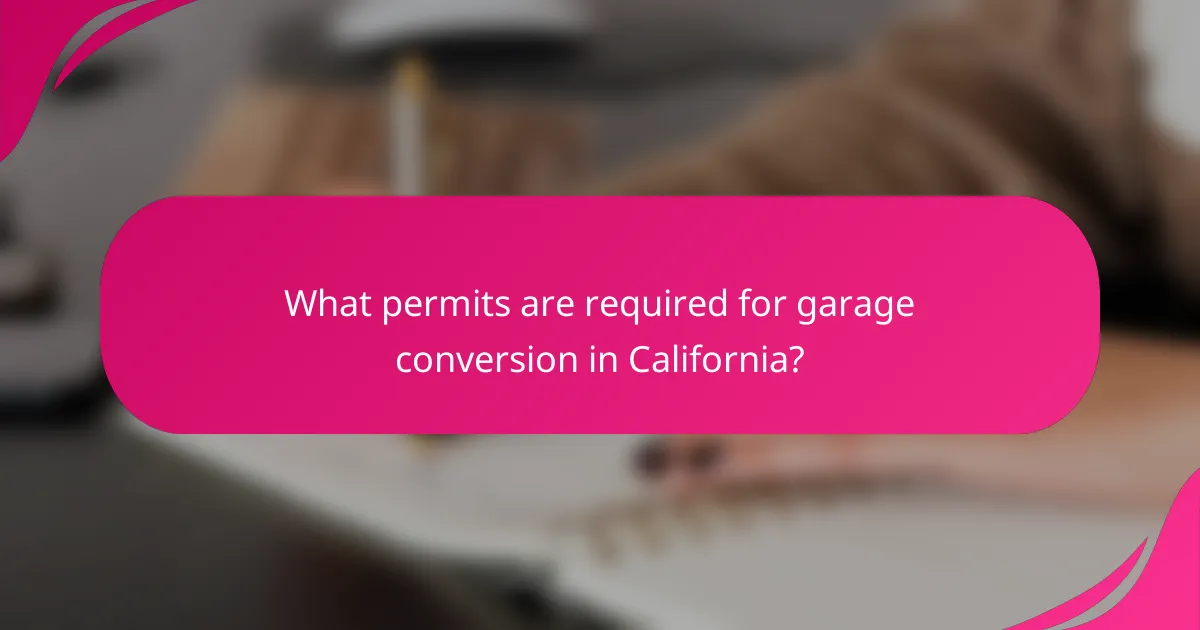Garage Conversion: functional living space, increased home value, design flexibility
A garage conversion can turn an underused area into a functional living space, significantly boosting your home’s value. This transformation allows homeowners to create versatile rooms tailored to their needs, while also offering a range of design options to enhance both usability and aesthetic appeal.

How can a garage conversion create functional living space in Los Angeles?
A garage conversion in Los Angeles can transform an underutilized area into a valuable living space, enhancing both functionality and home value. By reimagining this space, homeowners can create versatile rooms that cater to their specific needs.
Additional bedroom
Converting a garage into an additional bedroom is a practical solution for growing families or those needing extra space for guests. This conversion typically involves adding insulation, drywall, and appropriate flooring to ensure comfort and privacy.
Consider local zoning laws and building codes, as they may dictate minimum room sizes and window requirements. A well-designed bedroom can increase your home’s market value significantly, often recouping a substantial portion of the conversion costs.
Home office
A garage can be an ideal location for a home office, providing a quiet and separate environment for work. This conversion allows for customization, such as built-in shelves, adequate lighting, and soundproofing, to enhance productivity.
With the rise of remote work, having a dedicated workspace can increase your home’s appeal to potential buyers. Ensure that your office has proper electrical outlets and internet connectivity to support your work needs.
Guest suite
Transforming your garage into a guest suite offers visitors a comfortable and private space. This setup can include a small kitchenette and bathroom, making it self-sufficient and convenient for guests.
When planning this conversion, focus on creating a welcoming atmosphere with thoughtful design elements. Consider adding a separate entrance to enhance privacy and convenience for both guests and residents.
Playroom
A garage conversion into a playroom can provide children with a safe and dedicated space for play and creativity. This area can be equipped with storage for toys, games, and art supplies, keeping the rest of the home organized.
Incorporate child-friendly features such as soft flooring and bright colors to make the space inviting. Ensure that the room is well-ventilated and has adequate lighting for various activities.
Gym
Converting a garage into a home gym offers the convenience of working out at home without the hassle of a gym membership. This space can be tailored to your fitness needs, accommodating equipment like weights, cardio machines, and yoga mats.
Consider installing proper flooring to absorb impact and reduce noise. Ensure adequate ventilation and lighting to create a motivating workout environment, making it easier to maintain a consistent fitness routine.

What are the benefits of garage conversion for home value in California?
Garage conversion can significantly enhance home value in California by transforming underutilized space into functional living areas. This process not only increases the overall square footage but also caters to the growing demand for versatile spaces in residential properties.
Increased property value
Converting a garage into a livable space can lead to a notable increase in property value, often ranging from 10% to 20% depending on the quality of the conversion and local market conditions. Homeowners should consider the cost of the conversion against the potential increase in value to determine if the investment is worthwhile.
Factors such as location, design, and functionality play crucial roles in how much value a garage conversion adds. For instance, a well-designed studio apartment or an additional bedroom can be particularly appealing in urban areas where space is at a premium.
Higher resale potential
A garage conversion can enhance the resale potential of a home by appealing to a broader range of buyers. Many prospective homeowners are looking for flexible living spaces that can accommodate guests, create home offices, or serve as rental units.
In California’s competitive real estate market, properties with additional living space tend to sell faster. Homeowners should ensure that the conversion meets local building codes and zoning regulations to avoid complications during the sale process.
Attractive to buyers
Converted garages are attractive to buyers because they offer unique living solutions that traditional homes may lack. Features such as separate entrances, kitchenettes, or bathrooms can make these spaces highly desirable.
Marketing a home with a garage conversion should highlight its versatility and potential uses, such as an in-law suite or a home office. This can significantly enhance buyer interest and lead to quicker sales at higher prices.

What design options are available for garage conversions?
Garage conversions offer a variety of design options that can transform the space into a functional living area. Homeowners can choose layouts, finishes, and materials that suit their style and needs, enhancing both usability and property value.
Open concept layouts
Open concept layouts are popular for garage conversions as they create a spacious feel and promote natural light. By removing walls and barriers, you can integrate the garage with adjacent living areas, making it ideal for family gatherings or entertaining guests.
Consider using multifunctional furniture to maximize space efficiency. For example, a fold-out sofa bed can provide sleeping options without taking up permanent space, while a large dining table can serve as both a workspace and a dining area.
Modern finishes
Incorporating modern finishes can elevate the aesthetic of a garage conversion significantly. Options such as sleek cabinetry, polished concrete floors, and contemporary lighting fixtures can create a stylish and inviting atmosphere.
Choose finishes that are durable and easy to maintain, especially in areas prone to moisture. For instance, waterproof vinyl flooring can withstand wear and tear while providing a modern look.
Eco-friendly materials
Using eco-friendly materials in your garage conversion not only benefits the environment but can also improve indoor air quality. Sustainable options like reclaimed wood, bamboo flooring, and low-VOC paints are excellent choices for a green renovation.
Additionally, consider installing energy-efficient windows and insulation to reduce heating and cooling costs. This not only enhances comfort but can also lead to long-term savings on utility bills.

What are the costs associated with garage conversion in major U.S. cities?
The costs of garage conversion vary significantly across major U.S. cities, typically ranging from low tens of thousands to over a hundred thousand dollars. Factors influencing these costs include local labor rates, materials, and the complexity of the design.
Average conversion costs
On average, homeowners can expect to pay between $10,000 and $50,000 for a garage conversion, depending on the city and the scope of the project. For instance, cities like San Francisco and New York may see costs on the higher end, often exceeding $70,000 due to higher labor and material expenses.
In contrast, areas with lower living costs, such as parts of the Midwest, might offer conversions for as little as $15,000 to $30,000. The final price will also depend on whether the space is being converted into a simple living area or a more complex setup like a full apartment.
Cost-saving tips
To save on conversion costs, consider handling some of the work yourself, such as painting or minor repairs. This can significantly reduce labor expenses. Additionally, sourcing materials locally or opting for budget-friendly finishes can help keep the overall budget in check.
Another effective strategy is to plan the conversion during off-peak seasons when contractors may offer lower rates. Always obtain multiple quotes to ensure competitive pricing and explore potential discounts for larger projects.
Financing options
Homeowners have several financing options for garage conversions, including home equity loans, personal loans, and cash-out refinancing. Home equity loans typically offer lower interest rates since they are secured by the home’s value.
Alternatively, some may consider personal loans for smaller projects, which can be obtained quickly but usually come with higher interest rates. It’s advisable to evaluate all options and choose one that aligns with your financial situation and repayment capabilities.

What permits are required for garage conversion in California?
In California, a garage conversion typically requires several permits to ensure compliance with local building codes and regulations. Homeowners must obtain building permits, adhere to zoning regulations, and pass inspection requirements to successfully convert a garage into a livable space.
Building permits
Building permits are essential for any structural changes to a garage. Homeowners must submit detailed plans that outline the proposed conversion, including electrical, plumbing, and structural modifications. The cost of these permits can vary widely, often ranging from a few hundred to several thousand dollars, depending on the scope of the project.
It is advisable to consult with a licensed contractor or architect to ensure that the plans meet all local building codes. Failure to obtain the necessary permits can result in fines or the requirement to revert the garage back to its original state.
Zoning regulations
Zoning regulations dictate how properties can be used in specific areas, and they can significantly impact garage conversions. Homeowners should check with their local zoning office to determine if the conversion is permissible under current zoning laws. Some areas may have restrictions on the size or type of living space that can be created.
Additionally, homeowners may need to consider parking requirements, as converting a garage could affect the number of available parking spaces on the property. Understanding these regulations upfront can help avoid costly modifications later on.
Inspection requirements
After obtaining the necessary permits and completing the garage conversion, inspections are required to ensure compliance with safety standards. Typically, multiple inspections will occur during different phases of the project, including framing, electrical, and final inspections.
Homeowners should schedule these inspections promptly and ensure that all work is completed to code. Failing to pass an inspection can delay the project and lead to additional costs for corrections. Keeping clear communication with the local building department can help streamline this process.

How to choose a contractor for garage conversion?
Selecting the right contractor for a garage conversion is crucial for ensuring the project meets your expectations and stays within budget. Look for licensed professionals with experience in similar renovations, as their expertise will significantly impact the quality and efficiency of the work.
Research potential contractors
Start by gathering a list of potential contractors through online searches, recommendations from friends or family, and local home improvement stores. Check their websites for portfolios of past projects, customer reviews, and any certifications that demonstrate their qualifications.
Check credentials and experience
Verify that each contractor holds the necessary licenses and insurance required by local regulations. Experience in garage conversions specifically is essential, as this type of project often involves unique structural and design challenges.
Request quotes and compare
Contact your shortlisted contractors to request detailed quotes. Ensure that each quote includes a breakdown of costs, timelines, and materials. Comparing these elements will help you identify the best value while avoiding hidden fees.
Review contracts carefully
Once you select a contractor, review the contract thoroughly before signing. Pay attention to the scope of work, payment schedule, and warranty details. Clear terms will protect you from misunderstandings during the project.
Communicate throughout the project
Maintain open communication with your contractor throughout the conversion process. Regular updates and discussions about any changes or concerns will help keep the project on track and ensure your vision is realized.

Leave a Reply